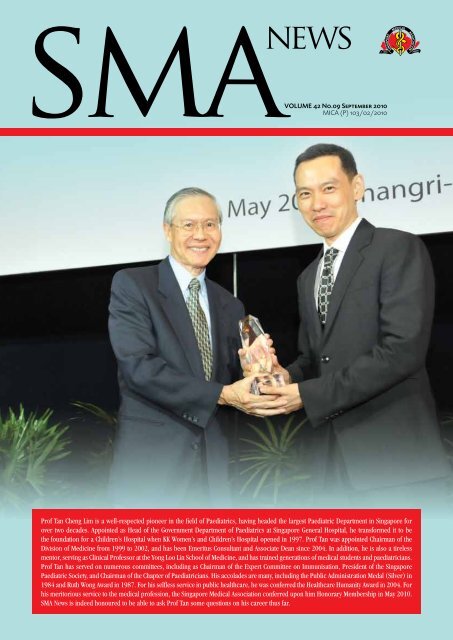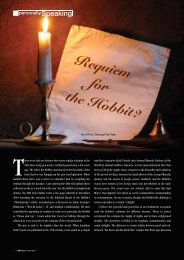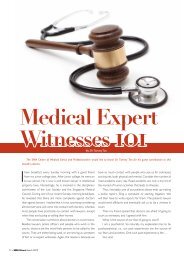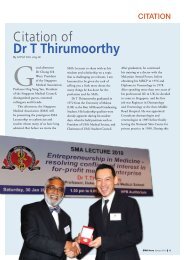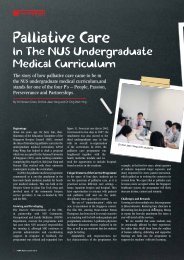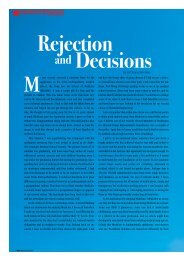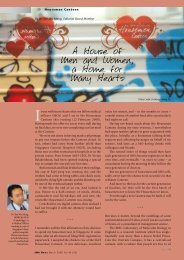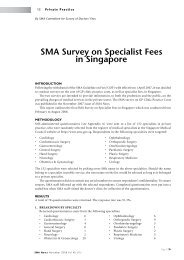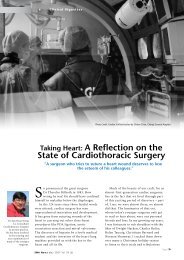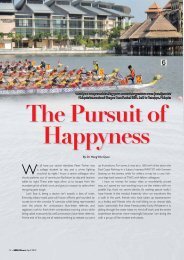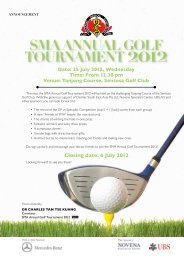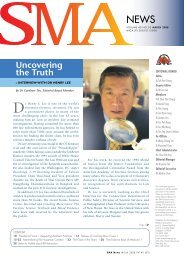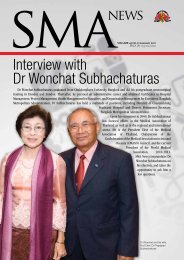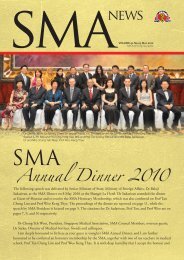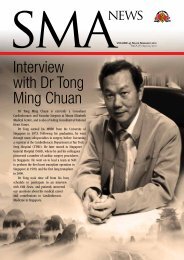Interview with Prof Tan Cheng Lim - SMA News - Singapore Medical ...
Interview with Prof Tan Cheng Lim - SMA News - Singapore Medical ...
Interview with Prof Tan Cheng Lim - SMA News - Singapore Medical ...
You also want an ePaper? Increase the reach of your titles
YUMPU automatically turns print PDFs into web optimized ePapers that Google loves.
VOLUME 42 No.09 September 2010<br />
MICA (P) 103/02/2010<br />
<strong>Prof</strong> <strong>Tan</strong> <strong>Cheng</strong> <strong>Lim</strong> is a well-respected pioneer in the field of Paediatrics, having headed the largest Paediatric Department in <strong>Singapore</strong> for<br />
over two decades. Appointed as Head of the Government Department of Paediatrics at <strong>Singapore</strong> General Hospital, he transformed it to be<br />
the foundation for a Children’s Hospital when KK Women’s and Children’s Hospital opened in 1997. <strong>Prof</strong> <strong>Tan</strong> was appointed Chairman of the<br />
Division of Medicine from 1999 to 2002, and has been Emeritus Consultant and Associate Dean since 2004. In addition, he is also a tireless<br />
mentor, serving as Clinical <strong>Prof</strong>essor at the Yong Loo Lin School of Medicine, and has trained generations of medical students and paediatricians.<br />
<strong>Prof</strong> <strong>Tan</strong> has served on numerous committees, including as Chairman of the Expert Committee on Immunisation, President of the <strong>Singapore</strong><br />
Paediatric Society, and Chairman of the Chapter of Paediatricians. His accolades are many, including the Public Administration Medal (Silver) in<br />
1984 and Ruth Wong Award in 1987. For his selfless service in public healthcare, he was conferred the Healthcare Humanity Award in 2004. For<br />
his meritorious service to the medical profession, the <strong>Singapore</strong> <strong>Medical</strong> Association conferred upon him Honorary Membership in May 2010.<br />
<strong>SMA</strong> <strong>News</strong> is indeed honoured to be able to ask <strong>Prof</strong> <strong>Tan</strong> some questions on his career thus far.
VOLUME 42<br />
NO.09 SEPTEMBER 2010<br />
EDITORIAL BOARD<br />
EDITOR<br />
Dr Toh Han Chong<br />
DEPUTY EDITOR<br />
Dr <strong>Tan</strong> Yia Swam<br />
MEMBERS<br />
<strong>Prof</strong> Chee Yam <strong>Cheng</strong><br />
Dr Martin Chio<br />
A/<strong>Prof</strong> Daniel Fung<br />
Dr Hsu Liyang<br />
Dr Jayant V Iyer<br />
Dr <strong>Lim</strong> Boon Leng<br />
Dr Jeremy <strong>Lim</strong><br />
Dr <strong>Tan</strong> Poh Kiang<br />
Dr <strong>Tan</strong> Wu Meng<br />
Dr Teo Eng Swee Cuthbert<br />
EX-OFFICIOS<br />
Dr Chong Yeh Woei<br />
Dr Abdul Razakjr Omar<br />
EDITORIAL EXECUTIVE<br />
Ms Gracia Ong<br />
The views and opinions expressed in all the articles<br />
are those of the authors. These are not the views<br />
of the Editorial Board nor the <strong>SMA</strong> Council unless<br />
specifically stated so in writing. The contents of<br />
the <strong>News</strong>letter are not to be printed in whole or in<br />
part <strong>with</strong>out prior written approval of the Editor.<br />
Published by the<br />
<strong>Singapore</strong> <strong>Medical</strong> Association,<br />
Level 2, Alumni Medial Centre,<br />
2 College Road, <strong>Singapore</strong> 169850<br />
Tel: 6223 1264<br />
Fax: 6224 7827<br />
Email: news@sma.org.sg<br />
URL: http://www.sma.org.sg<br />
<strong>SMA</strong> Reg. No.: ROS 198/59 TAP<br />
For classified advertisements and<br />
professional announcements, please contact <strong>SMA</strong>.<br />
Feature<br />
INTERVIEW WITH<br />
PROFESSOR<br />
TAN CHENG LIM<br />
<strong>SMA</strong> <strong>News</strong> - <strong>SMA</strong>: What made you decide to do<br />
Paediatrics and if you had a chance to do it all<br />
over again, would you choose Paediatrics as a<br />
specialty?<br />
PROF TAN CHENG LIM - TCL: I have always felt<br />
that the job of being a doctor gives us two main<br />
advantages over an ordinary desk job – it’s<br />
never boring, it’s challenging and one is not<br />
desk-bound, and at the same time one is doing<br />
good by serving humanity while at work.<br />
Surgery was out for me as I did not have the<br />
manual dexterity or courage for it. So my option<br />
was for Medicine and as it happened, my first<br />
posting as a <strong>Medical</strong> Officer was in Paediatrics<br />
and the friendly environment together <strong>with</strong> the<br />
joy of nurturing children back to health was a<br />
clear sign of where my option lay.<br />
On looking back, I certainly have no<br />
regrets. The warm camaraderie I have enjoyed<br />
<strong>with</strong> my fellow Paediatricians throughout my<br />
working life is an added bonus.<br />
<strong>SMA</strong>: As a Paediatrician, what are some of<br />
the trends you have noticed over the years<br />
in children both from a health and a social<br />
perspective?<br />
TCL: The change in the pattern of diseases<br />
in children in <strong>Singapore</strong> through the years<br />
is a well-known fact. As a young doctor,<br />
infections mainly of the respiratory system and<br />
gastrointestinal tract were our main concern.<br />
They could be severe, resulting in pneumonia ±<br />
empyema, meningitis and severe gastroenteritis<br />
<strong>with</strong> dehydration. Even miliary tuberculosis<br />
was seen, as were the viral exanthems like<br />
measles, chickenpox and rubella. These<br />
have largely dropped in significance <strong>with</strong> our<br />
comprehensive immunisation programme.<br />
While bacterial and viral infections still<br />
make up a significant part of our patient<br />
population, other diseases have come into<br />
prominence such as childhood obesity and<br />
diabetes, autoimmune diseases and cancers as<br />
well as children <strong>with</strong> psychosocial problems.<br />
Paediatric cancers have always been<br />
a challenge to Paediatricians. Paediatric<br />
oncologists have the advantage over their adult<br />
counterparts in the management of such cases<br />
as our overall cure rate is significantly better<br />
and continues to improve <strong>with</strong> modern-day<br />
chemotherapy.<br />
<strong>SMA</strong>: Even as a great mentor to generations of<br />
Paediatricians, who are your own mentors in<br />
the field of Paediatrics?<br />
I have always felt that the job of being a doctor<br />
gives us two main advantages over an ordinary<br />
desk job – it’s never boring, it’s challenging and<br />
one is not desk-bound, and at the same time one is<br />
doing good by serving humanity while at work.<br />
TCL: As I said earlier, my decision in what to<br />
specialise was made during my posting as a<br />
<strong>Medical</strong> Officer in Paediatrics. My Department<br />
Head was the late Dr <strong>Tan</strong> Kwang Hoh and I am<br />
truly indebted to him for planting the seeds for<br />
my decision to do Paediatrics <strong>with</strong> his interesting<br />
teaching, constant encouragement and timely<br />
<strong>SMA</strong> <strong>News</strong> september 2010 | 3
Feature<br />
advice. My other mentor whom I am really<br />
thankful for is Dr Chan Sing Kit who succeeded<br />
Dr <strong>Tan</strong> Kwang Hoh as Department Head. Her<br />
deep commitment to her work and caring<br />
nature was something to treasure and I had the<br />
good fortune to continue working under her for<br />
some years after getting my higher degree.<br />
<strong>SMA</strong>: Can you recount to us some of your fondest<br />
and deepest memories as a Paediatrician?<br />
TCL: My fondest and deepest memories as<br />
a Paediatrician have a lot to do <strong>with</strong><br />
some of my earlier Haematology/<br />
Oncology patients who continue to<br />
send me Christmas cards year after<br />
year. I feel grateful to receive nice<br />
meaningful notes from them to say<br />
they are well and working. Some of<br />
them have also gotten married. The<br />
cards come from <strong>Singapore</strong>, London<br />
and New York. A few also surprise me<br />
<strong>with</strong> e-mail messages.<br />
<strong>SMA</strong>: What is one experience that has<br />
shaped your life?<br />
TCL: In 1969 I was awarded a Colombo<br />
Plan Scholarship to Australia, having<br />
passed my Australian Membership<br />
Part I (theory) in <strong>Singapore</strong>. The<br />
Scholarship was given to attempt<br />
the second part of the exams i.e. the<br />
clinical section in Paediatrics. I was<br />
posted to the Royal Children’s Hospital<br />
in Melbourne to prepare myself for the<br />
exams, which were due four months<br />
into my posting.<br />
I was fortunate to meet Dr John Colebatch, the<br />
Head of Department of Haematology/Oncology<br />
during one of the clinical teaching sessions<br />
conducted by him and he very kindly offered<br />
to take me on as an honorary Haematology/<br />
Oncology Fellow in his Department should I pass<br />
the Membership exam. The end result was that I<br />
officially worked as a Fellow under him for the<br />
remaining six months of my scholarship and<br />
consolidated my interest in sub-specialising in<br />
that field.<br />
Dr Colebatch was highly respected as a<br />
Paediatric Haematologist/Oncologist and was a<br />
very kind person. We remained in regular contact<br />
for many years upon my return to <strong>Singapore</strong>.<br />
4 | <strong>SMA</strong> <strong>News</strong> september 2010<br />
<strong>SMA</strong>: What is one experience that you wish to<br />
forget?<br />
TCL: I have been scratching my head to think<br />
of the most impatient or difficult patient I<br />
have had to deal <strong>with</strong> in my career but cannot<br />
remember any memorable one!<br />
<strong>SMA</strong>: You were involved in the work of<br />
<strong>Singapore</strong> Children’s Society, what are<br />
your views on what roles VWOs can play in<br />
children’s health?<br />
All doctors are basically expected<br />
to have sufficient knowledge,<br />
wisdom, compassion and skills<br />
in the management of their<br />
patients. I would say a great<br />
doctor possesses true compassion<br />
and empathy, professionalism,<br />
is approachable and fully<br />
knowledgeable <strong>with</strong> inner<br />
confidence in himself and yet<br />
showing humility. He also truly<br />
appreciates the help of his fellow<br />
healthcare workers – fellow<br />
colleagues and nurses alike.<br />
TCL: I have been involved <strong>with</strong> the <strong>Singapore</strong><br />
Children’s Society (SCS) for more than 30<br />
years.<br />
VWOs can play very important roles in<br />
the area of children’s health and welfare, and<br />
the SCS is an outstanding example, having<br />
been led by deeply committed Chairmen and<br />
committees throughout the years. This has<br />
resulted in the SCS being a shining example<br />
of a VWO showing true dedication and<br />
commitment in the area of children’s health<br />
and welfare. Their Convalescent Home beside<br />
the beach at Changi in the sixties was an ideal<br />
site to house debilitated children recovering<br />
from malnutrition and chronic diseases like<br />
malaria and tuberculosis. SCS moved <strong>with</strong><br />
the times <strong>with</strong> the closing of the Convalescent<br />
Home and the current running of Sunbeam<br />
Place in Bishan which is a welfare home to<br />
victims of child abuse, neglect and broken<br />
homes among other present-day problems.<br />
Fortunately <strong>Singapore</strong>ans are very<br />
forthcoming and generous in donating to<br />
VWOs involved in the care of children, and<br />
the SCS’s proven track record is a real boost<br />
in this respect.<br />
<strong>SMA</strong>: The World Health Organisation has<br />
stated that there is no health <strong>with</strong>out<br />
mental health. Can you comment on the<br />
many challenges on the emotional life<br />
of the family and how that has impacted<br />
on children’s health?<br />
TCL: As a relatively small and young<br />
nation, we have certainly made<br />
remarkable progress in many ways,<br />
including health matters. With success,<br />
we invariably begin to see the many<br />
challenges emerging in the emotional<br />
life of families disadvantaged in<br />
various ways – financial or otherwise.<br />
Inadequate parental skills causing<br />
emotional problems in families can<br />
be aggravated by various factors. For<br />
example the belief of many parents<br />
that their children need private tuition<br />
to augment what they have learnt in<br />
school may unnecessarily stress them,<br />
while paradoxically, the less welloff<br />
are unable to afford tuition for<br />
deserving slow learners.<br />
Parents need to learn how to build<br />
up self-esteem in their school-going children<br />
to cope <strong>with</strong> their studies. Unfortunately the<br />
obsession of the average <strong>Singapore</strong>an family<br />
to ensure their children come out tops in their<br />
cohort is probably the main reason why we<br />
are seeing more children <strong>with</strong> psychosocial<br />
problems, and we find we need the input<br />
of the Child Psychiatrist or Psychologist for<br />
joint management when these problems are<br />
complex and longstanding.<br />
The increasing divorce rates affecting<br />
all three major races in <strong>Singapore</strong>, which<br />
probably has a strong link to the increasing<br />
number of child abuse and neglect cases we<br />
are handling in hospitals is further evidence<br />
of our shortcomings in family bonding.
Mrs <strong>Tan</strong> <strong>Cheng</strong> <strong>Lim</strong>, <strong>Prof</strong> <strong>Tan</strong> <strong>Cheng</strong> <strong>Lim</strong>, <strong>Prof</strong> Woo Keng Thye and Dr Chong Yeh<br />
Woei at <strong>SMA</strong> Annual Dinner 2010<br />
<strong>SMA</strong>: What are some of the exciting frontiers<br />
of Paediatrics?<br />
TCL: The technological advances in the field<br />
of medicine have revolutionised the practice<br />
of medicine especially in invasive procedures.<br />
For example, Paediatric Cardiologists can<br />
go into areas that previously needed the<br />
intervention of the Paediatric Cardiac Surgeon<br />
(for example, the closure of PDA, VSD, ASD<br />
and other more complex problems). New<br />
diagnostic imaging tools and interventional<br />
radiology have also benefitted our paediatric<br />
patients. Similarly the field of genetics and<br />
genetic engineering promises us an exciting<br />
future in the prevention and management of<br />
genetic diseases, which includes the field of<br />
oncology, and is of special interest to me.<br />
<strong>SMA</strong>: Why is medical research important to<br />
the healthcare landscape of <strong>Singapore</strong>?<br />
TCL: This is a natural progression to what we<br />
have achieved in the delivery of healthcare to<br />
our fellow citizens.<br />
In the sixties we were ranked by WHO to be<br />
somewhere in the middle in comparison <strong>with</strong><br />
other countries on the standard of delivery of<br />
healthcare, as measured by infant mortality<br />
rate, for example. Today we are right at the<br />
top and among the top three countries in the<br />
world in this respect. We need to conduct<br />
medical research on our own population and<br />
we have the resources and ready finance to do<br />
so, to keep up the good work.<br />
<strong>SMA</strong>: What qualities make a great doctor?<br />
TCL: All doctors are basically expected to have<br />
sufficient knowledge, wisdom, compassion<br />
and skills in the management of their patients.<br />
I would say a great doctor possesses true<br />
compassion and empathy, professionalism, is<br />
approachable and fully knowledgeable <strong>with</strong><br />
inner confidence in himself and yet showing<br />
humility. He also truly appreciates the help<br />
of his fellow healthcare workers – fellow<br />
colleagues and nurses alike.<br />
<strong>SMA</strong>: Which five books would you bring to a<br />
desert island, air-con study room provided of<br />
course?<br />
TCL: May I confess that I would prefer to<br />
bring my five favourite CDs – mainly oldies,<br />
switch off the air-con, lie on the beach and<br />
enjoy the scenery and music at the same time!<br />
<strong>SMA</strong>: What would constitute a great meal for<br />
you?<br />
TCL: I am no great connoisseur of good food<br />
Feature<br />
and would enjoy any tasty meal, be<br />
it local or western. Left to my own<br />
devices, I would favour a simple<br />
western meal provided it is nicely<br />
fried or grilled, such as a juicy beef<br />
steak, pork, chicken chop or even<br />
fish and chips fried <strong>with</strong> a nice batter.<br />
My wife does not quite approve of<br />
the fried part and will often remind<br />
me that I am a doctor!<br />
<strong>SMA</strong>: What are your hobbies,<br />
and what is your view on soccer<br />
programmes on television?<br />
TCL: I used to participate in<br />
athletics in primary and secondary<br />
school before switching to social<br />
tennis and squash. Unfortunately<br />
I had to stop all these sporting<br />
activities completely in 1990 when<br />
I suffered a retinal detachment<br />
after accidentally banging my head on the<br />
wall while playing a game of squash. I am<br />
eternally grateful to Dr Victor Yong who was<br />
Head of Department of Ophthalmology in<br />
SGH then. He diagnosed it and successfully<br />
operated on me the very day I consulted him<br />
about it.<br />
Since then I mainly enjoy easy listening<br />
music or watch sports on TV. I must confess<br />
that I used to be an avid wrestling fan <strong>with</strong><br />
the World Wrestling Federation (WWF)<br />
series being my favourite programme, but<br />
stopped years ago when I felt that too many<br />
of their fights were staged. Championship<br />
(Grand Slam) tennis and EPL soccer are now<br />
my favourite programmes, and I have been a<br />
Manchester United fan for years.<br />
I used to enjoy both tennis and soccer<br />
programmes on Starhub cable. It is<br />
somewhat irritating that I have to subscribe<br />
to SingTel as well because EPL soccer is now<br />
only available on this line, and its drawback<br />
is that it takes a couple of minutes for the<br />
programme to come on – by which time I<br />
may have missed the thrill of witnessing a<br />
goal scored live!<br />
<strong>SMA</strong>: Thank you for the great interview,<br />
<strong>Prof</strong> <strong>Tan</strong>.<br />
<strong>SMA</strong> <strong>News</strong> september 2010 | 5


